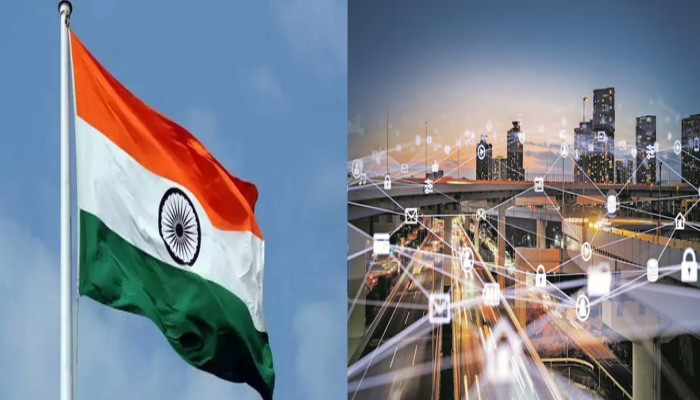India endorses tech democracy, offers to share its DPI with the world
- In Reports
- 03:45 PM, Apr 25, 2025
- Myind Staff
India has announced that it is growing its Digital Public Infrastructure (DPI) system into new areas like agriculture and smart cities. The country is also ready to share its accomplishments with the rest of the world. UN leaders praised India for taking the lead in building and investing in this area.
Jitin Prasada, Minister of State for the Ministry of Commerce & Industry and the Ministry of Electronics & Information Technology, said that the Indian DPI success story is a "showcase to the world". "DPI is focused on giving power to people, ensuring good governance, and supporting growth that includes everyone and lasts over time. 'The future will not be built by machines alone but by the choices we make about how technology serves humanity,' Prasada said during his keynote speech at the event hosted by India's Permanent Mission to the UN at the world body's headquarters on Thursday." Prasada also mentioned that India is now working on expanding its Digital Public Infrastructure (DPI) to new areas like agriculture, logistics, smart cities, and more.
"The next wave will prioritise privacy and data protection, digital skilling and literacy, cross-border DPI partnerships, sustainability and resilience. Artificial Intelligence is going to be a force multiplier for DPI. India is deploying AI, keeping in mind our philosophy of serving the last person at the bottom of the pyramid," he said. Prasada stated that India believes technology should be accessible to everyone, affordable, and should enhance human dignity. This is what India’s digital public infrastructure stands for.
Philemon Yang, the President of the 79th session of the UN General Assembly, praised India for successfully transforming digitally and for leading the way in investing in digital public infrastructure. "I commend India on the success of its digital transformation and leadership in investing in digital public infrastructure. Indeed, digital public infrastructure holds the key to inclusion in the global digital society. And these technologies are evolving at breakneck speed," he said at the special event titled Empowering the Digital Citizen of the Future: Towards an Integrated Digital Public Infrastructure (DPI)'.
Yang mentioned that digital technologies are changing every part of human life. They are transforming economies, cutting costs, creating new opportunities in education and healthcare, and giving people more power than ever before. "In India, for example, it means 'anywhere access' to 'anytime vaccination' for any registered pregnant woman or child across the country, he said. Yang mentioned that he felt fortunate to witness the U-WIN digital initiative firsthand earlier this year. He expressed his admiration for the positive impact when digital infrastructure focuses on women and girls as a central part of the digital revolution. He emphasised that these technologies have great potential to drive progress across the Sustainable Development Goals. India's Ministry of Health and Family Welfare introduced the U-WIN (Universal Immunisation Win) system, which simplifies the entire vaccination process.
Prasada highlighted that digital public infrastructure (DPI) is scalable, impactful, and beneficial. It's not just infrastructure for a select few, but a system designed to serve many. "A global public good. The world is taking note," he said, noting that over 18 countries are exploring or adopting India's DPI - from Singapore integrating UPI to Sierra Leone piloting digital ID, and DPI elevated to a global agenda at the G20. He said India is advocating for more involvement of the Global South in discussions about AI.
"The digital citizen of the future must not be a consumer of technology, but a co-creator of equity... India stands ready to collaborate by sharing its DPIs," Prasada said, noting that India's DPI proves that development can be fast, fair and frictionless. "When inclusion is coded into design, exclusion becomes obsolete. Let us work to build a world where digital dignity is a right, not a privilege."
India's Permanent Representative to the UN, Ambassador P Harish, shared that since Prime Minister Narendra Modi launched the Digital India initiative in 2015, India has introduced several major digital transformation projects. He mentioned key programs like Aadhaar, the Unified Payments Interface (UPI), and the Pradhan Mantri Jan Dhan Yojana. He also talked about the JAM Trinity (Jan Dhan-Aadhaar-Mobile), which links 540 million Jan Dhan bank accounts, Aadhaar cards, and mobile numbers. This system allows direct transfer of government subsidies to citizens in need, making it the world's largest financial inclusion program and reducing corruption and leaks.
Harish also emphasised how Artificial Intelligence (AI) is transforming Indian agriculture by improving productivity, better managing resources, and helping 200 million farmers make smarter decisions. The digital citizens of the future need an integrated Digital Public Infrastructure (DPI) supported by AI systems, ensuring that no one is left behind in the digital world. It is our responsibility to work towards this goal, and India is the ideal partner for this effort, especially for countries in the Global South.
Amandeep Singh Gill, the UN Secretary-General's Special Envoy for Digital and Emerging Technologies, praised India’s work with DPIs as a model. He also highlighted successful examples from regions like Brazil, Southeast Asia, and Africa. Gill emphasised that there is now enough evidence showing that DPIs not only work but can also have a major, positive impact at a large scale. Gill further explained that improving interoperability between DPIs could boost trade within regions, between regions, and support digital entrepreneurs. He mentioned that in challenging global trade conditions, there’s significant potential to build resilience and help entrepreneurs grow by connecting DPIs and making them more interoperable.
Additionally, Srikanth Nadhamuni, the Founding CTO of Aadhaar and CEO of Khosla Labs, shared how India is using artificial intelligence to enhance its DPI and how this inclusive approach can set a transformative example for countries globally.







Comments